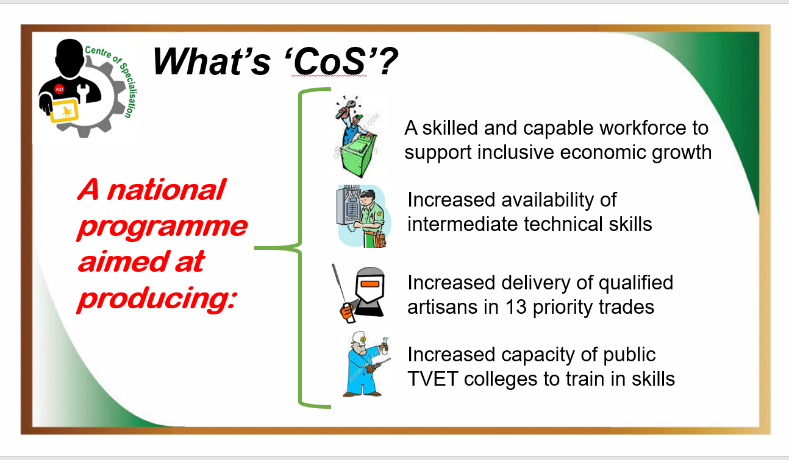Aligning supply and demand through Centres of Specialisation in South Africa


Institution: Multi-stakeholder pilot led by the Department of Higher Education
The Centres of Specialisation (CoS) Programme is a pilot project initiated by the South African Department of Higher Education and Training (DHET). The pilot aims to:
- Address shortages in the trades and skills areas identified as priorities for national development
- Improve the public TVET college system so that it delivers high-quality trade qualifications that meet the needs of employers.
CoS aims to model ways in which industry and employers can partner with public colleges and other relevant bodies to revitalise the delivery of trade and occupational qualifications to meet industry standards and the needs of the economy.

Selected TVET colleges will be developed into centres of specialisation dedicated to training artisans in one or more of these priority trades.
The pilot programme students will be those already employed as apprentices, who will attend college for the theory and practical skills elements of a qualification. Students will be exposed to current and real workplace practices during training so that they are work-ready once qualified. To this end, the ‘dual system’ (where learners rotate between the college and the workplace) is being tailored to meet specific South African conditions, to produce the ‘artisan of the 21st century’, or the A21 artisan.
Good practice features include:
- Secured funding- the government funds the pilot programme through the National Skills Fund.
- Multi-stakeholder in terms of consultation, management, and implementation processes:
- National level, government as a sponsor is actively involved;
- Provincial and municipal bodies play a role in the placement of students in relevant government departments;
- Bodies dealing with qualifications, industry standards, and trade tests have responsibilities in terms of monitoring standards and assessing students.
- Trade and industry associations related to specific trades appoint industry experts to teams to support the rollout of the qualifications. Industry representatives work with the colleges to participate in syllabus, materials, and trade test developments.
- Finally, a significant innovation is the establishment of high-level committees which include employers at the TVET colleges, thereby bringing industry input directly to the colleges.
- The pilot supports the implementation of the new occupational qualifications for the thirteen trades; these provide a single standard per trade for the labour market.
- College benefits:
- The status of TVET will be raised because of the improved capacity to deliver
- There is an increased perception of colleges being a viable post-school study option
- Contact with a wide range of employers, laying the foundation for future partnerships
- Colleges are will receiving resource top-ups to ensure that they have the infrastructure, workshops, and equipment to meet CoS requirements for their trades.
- Students who graduate from the relevant programmes will have an improved prospect of employment as the training will be of high quality, relevant and up-to-date.
The pilot is now at the point of implementation, with colleges ready to begin rollout. At this point in the pilot’s life cycle, some key results are as follows:
- Twenty-six delivery sites in 19 public TVET colleges are committed to the pilot.
- Trained- 49 facilitators / TVET college lecturers.
- Recruited 518 apprentices, all of whom will begin their theory and practical skills components and workplace rotations during 2019. The first 16 students started in March 2019.
- Over 90 employers (including municipalities and government departments) across the thirteen trades have either committed to workplace hosting or are in process discussions.
A significant achievement has been the recognition by the main role-players – government, agencies involved in skills development, industry and trade associations, employers and TVET colleges themselves – of the need for a shared vision of an integrated TVET system where education, training, industry needs, and employment are part of a unified system.
The pilot programme continues until March 2022, at which point the first wave of CoS apprentices will successfully qualify as artisans. Gathering evidence of learnings and success factors, as well as recording relevant data from the pilot, will be an ongoing process. Some lessons learned so far include:
- Regular and structured communication between all role-players is essential, enabling speedy decision-making on adaptations to the programme as it unfolds. The institutional mechanism ensures buy-in to the pilot principles so that all involved agencies can support systemic sustainability in the future.
- Messaging to sell the value to employers and colleges is vital, need to communicate the value-gained by each party from their perspective.
- It is difficult to find placements with employers in rural areas, and creative strategies will be needed to partner with small companies, communities, and municipalities.
Moving Forward…
- The notion of specialist centres for certain trades serves as a model for future expansion in other skills areas, including 21st-century trades such as megatronics. The model will, therefore, allow for replication.
- Geographic ‘clustering’ of centres will be mapped to local industries and needs.
- The industry associations involved in the pilot will focus on continuous improvement of lecturer capacity, through formal mentoring programmes and the placement of lecturers in the industry to update their skills and knowledge up until 2022.
Resources
https://careerplanet.co.za/centres-of-specialisation-cos/
http://www.cct.edu.za/wp-content/uploads/2018/02/Employers-flyer-FINAL-004.pdf
